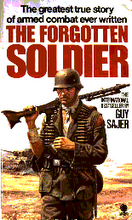Well I assume that I am to continue writing on this piece that I chose so I will go into a little more detail of how I came to read this for the first time.
During my time in Middle School I became an avid enthusiast for anything related to WWII. My interest being sparked by my Middle School history teacher, Mr. Corkett, who introduced me to war-gaming, a model based reenactment of historical and even fictitious battles. Corkett was a WWII historian who studied extensively on the event. He had been involved in the war-gaming of WWII for over 20 years, and with his teaching also formed a War-game club where students could join to play these reenactments and learn about the war in one form or another. Now to most this was a game, but I gained a very strong interest in the actual history of WWII and spent much of my time studying what I consider the most fascinating time in human history. The book I received as Christmas gift from my parents about two years after I started in the club. At first I skimmed over various parts just for kicks thinking that is was just another boring interpretation of the war. But looking more and more into Sajer’s autobiography I found myself reading not just for the story but also for the historical facts that were hidden within the text. I found that the knowledge I had acquired in my years of studying was being put in context in an actual story that someone had lived. I found myself seeing the war differently than I had before, not as an array of tactical/strategic maneuvers being implemented in a timeline across the European map, but instead as the brutal, destructive thing that war is.
Subscribe to:
Post Comments (Atom)

2 comments:
Matt,
What an interesting experience you relate here on the power of narrative to transform your experience and interest in a topic--from an archive of knowledge to an encounter with story. There must be many memoirs and novels of WWII--what is it about Sajer that evokes so many questions about its historicity?
Meg
It's good to hear how you discovered this material. I have been a big investigator of World War One, and was in Kansas City the first week the World War One Museum opened there this May. It was supposed to be the "war to end all wars." So sorry you have a newer war to study, M.
Post a Comment